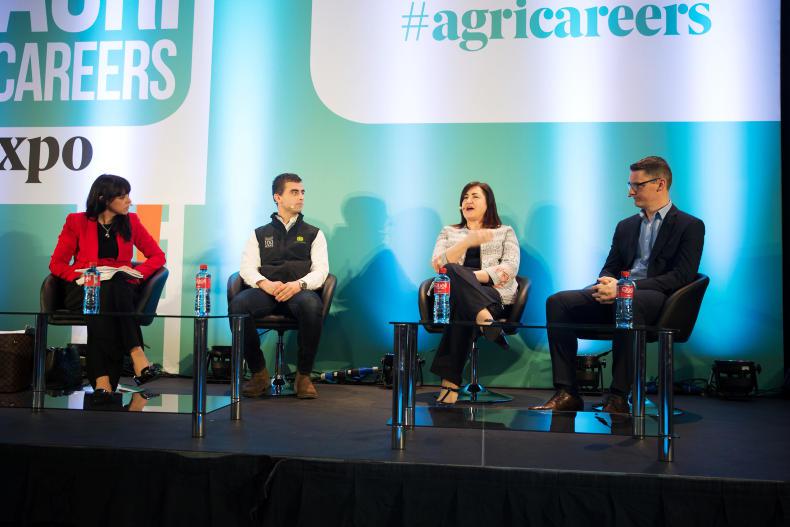The agri-food sector has one of the most dynamic, skilled and innovative workforces within our economy,” so said Minister Michael Creed as he officially opened the 2019 Irish Farmers Journal Agri Careers Expo in partnership with Devenish last week.
There was a real air of positivity at the event.
Some of the Twitter commentary used uplifting language like “exciting energy”, “vibrancy”, “buzzing” and “inspiration”. Richard Kennedy from Devenish said that it was a “hall full of ambition”.
Food Wise 2025 highlights human capital, the attraction, retention and development of talent along the supply chain as one of its five themes. But within this lies a conundrum in the perceived secure jobs of the industry and the unsecure future of Irish farmers.
The agri-food sector makes a significant contribution to employment, particularly in rural and coastal areas, playing a vital role in ensuring their continued viability.
Employment in the agri-food sector accounted for an average of 174,400 jobs in 2017.
Within this number, a huge proportion are farmers, the producer of the primary product, the story, the marketing tool, the reason we can export to 180 countries – the fulcrum from which all other jobs are leveraged. So realistically speaking, reading about the opportunities and indeed salaries that are often referred to as “coming off the back of the animal” may be a source of frustration to Irish farmers, many of whom are in a very difficult economic position following an exceptionally difficult 2018.

Amii McKeever, Irish Farmers Journal in conversation with Mark O'Meara of John Deere,Karen Coyle of Bord Bia and John Murray of Kerry Group. \ Barry Cronin.
There is a war for talent and the agri-business industry needs talent as much if not more than other industries in the face of ongoing change and challenge.
Much like all things, an injection of new ideas and new blood is important to ensure continued vibrancy. An EY survey last year put retention of existing staff as the top concern of HR managers, followed by attracting new top-tier employees.
The “job for life” mentality is gone and people are willing to move to get paid better, for better conditions and advancement.
A non-agri business firm typically produces output to meet expected market demand.
In our industry, long investment cycles for farmers and companies can typically mean that there can be considerable time lags between planning and outcomes and we all know that a lot can happen in agriculture in a short space of time.
To win at tug-of-war, you must carefully position your team
The opportunity for profit between the time a farmer calves a cow and that animal reaching sale weight can move in either direction completely outside of the control of farmers or business. There is a real requirement for the full chain to pull together to ensure the future viability of the jobs that hinge on the primary product.
To win at tug-of-war, you must carefully position your team – you put someone with endurance at the back – you put them at the end of the rope so they can anchor the team.
This week, Mairead Lavery has started her new series, Around the Table, where she will hear the views of farmers around the country on how they are adapting to changing times.
One of the final words from her piece really rang home to me: “Everyone has a vested interest in keeping farmers going. They are the last man on the rope.”
Read more
Jobs match-made in the agri industry on St Valentine’s Day
Where do we draw the line on social media influence?
The agri-food sector has one of the most dynamic, skilled and innovative workforces within our economy,” so said Minister Michael Creed as he officially opened the 2019 Irish Farmers Journal Agri Careers Expo in partnership with Devenish last week.
There was a real air of positivity at the event.
Some of the Twitter commentary used uplifting language like “exciting energy”, “vibrancy”, “buzzing” and “inspiration”. Richard Kennedy from Devenish said that it was a “hall full of ambition”.
Food Wise 2025 highlights human capital, the attraction, retention and development of talent along the supply chain as one of its five themes. But within this lies a conundrum in the perceived secure jobs of the industry and the unsecure future of Irish farmers.
The agri-food sector makes a significant contribution to employment, particularly in rural and coastal areas, playing a vital role in ensuring their continued viability.
Employment in the agri-food sector accounted for an average of 174,400 jobs in 2017.
Within this number, a huge proportion are farmers, the producer of the primary product, the story, the marketing tool, the reason we can export to 180 countries – the fulcrum from which all other jobs are leveraged. So realistically speaking, reading about the opportunities and indeed salaries that are often referred to as “coming off the back of the animal” may be a source of frustration to Irish farmers, many of whom are in a very difficult economic position following an exceptionally difficult 2018.

Amii McKeever, Irish Farmers Journal in conversation with Mark O'Meara of John Deere,Karen Coyle of Bord Bia and John Murray of Kerry Group. \ Barry Cronin.
There is a war for talent and the agri-business industry needs talent as much if not more than other industries in the face of ongoing change and challenge.
Much like all things, an injection of new ideas and new blood is important to ensure continued vibrancy. An EY survey last year put retention of existing staff as the top concern of HR managers, followed by attracting new top-tier employees.
The “job for life” mentality is gone and people are willing to move to get paid better, for better conditions and advancement.
A non-agri business firm typically produces output to meet expected market demand.
In our industry, long investment cycles for farmers and companies can typically mean that there can be considerable time lags between planning and outcomes and we all know that a lot can happen in agriculture in a short space of time.
To win at tug-of-war, you must carefully position your team
The opportunity for profit between the time a farmer calves a cow and that animal reaching sale weight can move in either direction completely outside of the control of farmers or business. There is a real requirement for the full chain to pull together to ensure the future viability of the jobs that hinge on the primary product.
To win at tug-of-war, you must carefully position your team – you put someone with endurance at the back – you put them at the end of the rope so they can anchor the team.
This week, Mairead Lavery has started her new series, Around the Table, where she will hear the views of farmers around the country on how they are adapting to changing times.
One of the final words from her piece really rang home to me: “Everyone has a vested interest in keeping farmers going. They are the last man on the rope.”
Read more
Jobs match-made in the agri industry on St Valentine’s Day
Where do we draw the line on social media influence?







 This is a subscriber-only article
This is a subscriber-only article










SHARING OPTIONS: